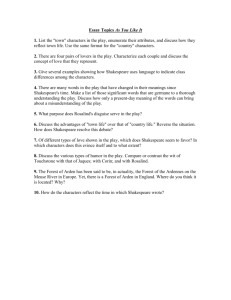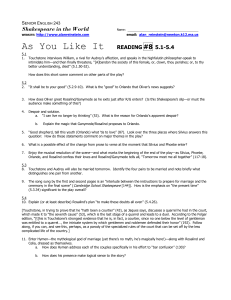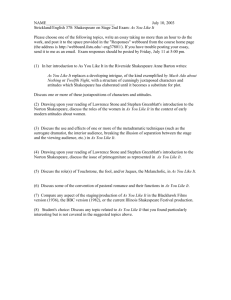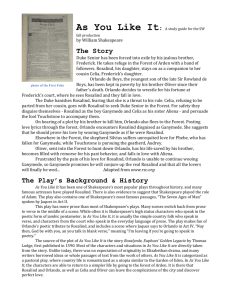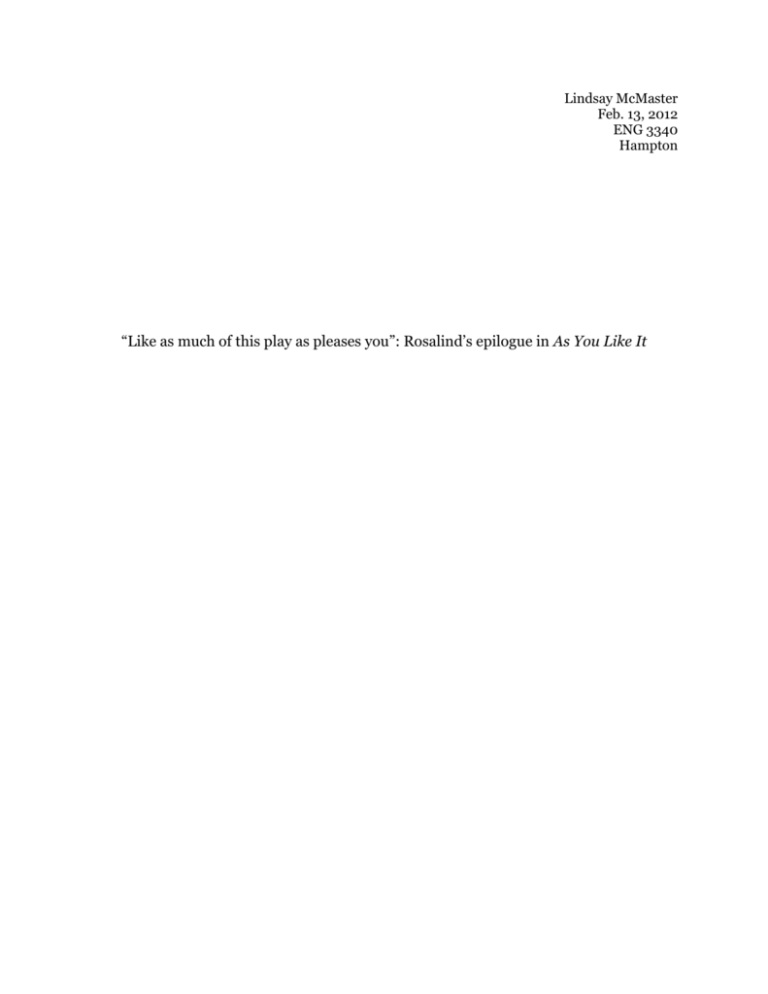
Lindsay McMaster
Feb. 13, 2012
ENG 3340
Hampton
“Like as much of this play as pleases you”: Rosalind’s epilogue in As You Like It
William Shakespeare’s pastoral comedy As You Like It is a whirlwind of comedy,
romance, and only slight hints of menace. At a glance, this world full of slapdash
rivalries, repentances, and marriages can be written off as being completely over-thetop. The infamous quadruple marriage at the end of the play feels too conveniently neat,
not to mention incredibly hasty. The question, then, is whether Shakespeare was simply
lazy in writing this play, or whether he intended his audience to gather more meaning
from the subtextual and structural elements from the play than the actions of the
characters. In addressing this question, Rosalind’s epilogue is of chief importance. Any
writer knows that his or her readers will like whatever parts of their work that the
readers choose. Why then, in this play, did Shakespeare write for one of his characters
the lines which instruct the audience or reader to do just that?
When Shakespeare wrote Rosalind’s epilogue, he was experimenting with a
technique which would not become popular until the 19th century. In this closing
speech, Shakespeare allows one of his principal actors to step forward and break
through the fourth wall that separates the world of the play from the “real world” of the
audience while simultaneously breaking down the costume that allowed the audience to
perceive the character Rosalind. It forces members of the audience to remove
themselves from the forest of Arden and bring their consciousness back to the
playhouse. Perhaps the most famous lines of the play are spoken in Act II, when Jaques
says, “All the world’s a stage, / And all the men and women merely players.” Coming
from the melancholy Jaques, this philosophical musing feels pessimistic, like humans
are never true to themselves or have no real value. So are we, as humans, “merely
players”? The epilogue is perhaps the finest jewel of the play, in that it not only brings
the story and the action of the play down to the level of the audience, but also reinforces
the idea that humans have the power to alter their appearance and their perceptions. As
to how this power should be used or viewed, Shakespeare leaves the conclusion to the
audience.
As You Like It involves many abrupt changes in character. Duke Frederick
repents and declares he will live out his days in a monastery. After Orlando rescues
Oliver from the lion, Oliver immediately apologizes to Orlando for treating him
inappropriately in the past. Celia and Oliver fall in love almost instantaneously, while
Phoebe is forced to forget her love for Ganymede and marry Silvius, who she had no
prior interest in. Then, of course, is the transformation of Ganymede into Rosalind and
Orlando’s immediate delight upon seeing her again. Arguably, the play ends happily for
all but one of the characters: Jaques. Interestingly enough, he is perhaps the only major
character who does not experience any change in personality or appearance during the
course of the play, and readers get the sense that he never will. It is another question
altogether as to whether his melancholy causes his unchangingness or vice versa, but
most readers or audience members are likely to see him as being somewhat less than
happy. At the end of the play, Jaques’s pessimistic speech about the inevitabilities of life
is not foremost in the minds of the audience. As rushed or ridiculous as the quadruplemarriage may seem, there is still something rewarding about seeing the main characters
finally gain their hearts’ desires.
By placing his main characters on the two opposite sides of the philosophical
spectrum, pessimistic and optimistic, perhaps Shakespeare hoped that his audience
would be tempted to fall somewhere in between the two extremes. An intriguing passage
tucked into Act II consists of Touchstone’s words reiterated by Jaques. Touchstone
remarks, “And so, from hour to hour, we ripe and ripe, / And then, from hour to hour,
we rot and rot; / And thereby hangs a tale” (2.7.27). Here again Shakespeare leads his
audience to reflect on life, but in a nebulous fashion and, once more, leading the
audience members to form their own conclusions. They can choose to see things from
either the optimistic or pessimistic perspective, or perhaps even something of both, and
this reflects how they will shape their life. In these lines, we see Shakespeare again
playing with the idea of the ambiguity of our perceptions.
To return to Jaques’s soliloquy in Act II, the question of whether humans
resemble actors is one which Shakespeare seems to be meditating on in this play.
Perhaps Shakespeare believes that humans are like players, but by writing a play that
contains so much human malleability, maybe Shakespeare is more interested in the
question of whether the ability of humans to change both their appearance and their
perceptions is a kind of freedom. This is especially reinforced by Rosalind’s epilogue
when the actor, as Shakespeare’s mouthpiece, essentially reminds the audience that he
is only a player. “What a case am I in then, that am neither a good epilogue / nor cannot
insinuate with you in the behalf of a good play” (Ep.7-9)! the actor says. From this the
audience gets the sense that Shakespeare is challenging them to say that, false as the
world of the play may be, they did not enjoy the play all the same. Rosalind’s epilogue,
by form even more so than content, perfectly reiterates and reinforces the idea that all
humans are players of some sort, but that there is something to relish in this quality and
ability.
The mutability of gender is a very prominent theme in As You Like It, and
traditional boundaries between the sexes become blurred both within the play and
without. Within the play, if one assumes Orlando is unaware of his beloved in disguise,
there is a significant homoerotic element. As Ganymede pretends to be Rosalind,
Orlando is all too willing to transfer even physical affection to who he believes to be a
young man. “And his kissing is as full of sanctity as the / touch of holy bread” (3.4.1314), Rosalind says to Celia of her meetings with Orlando in the guise of Ganymede.
Readers are then forced to ponder the question of whether it is so far-fetched for a man
to float between attraction to men and women when the lines between the two are not
clearly defined. Shakespeare might be insinuating that, if Ganymede can give Orlando
everything that he desires of Rosalind, there is no reason why Orlando should not be
attracted to him.
As You Like It is neither the first nor last of Shakespeare’s plays to involve a
female character disguising herself as a man, but this play is definitely unique. This is
due in part to the fact that a male actor is playing a woman, who is pretending to a man,
who then pretends to be a woman. The uniqueness of the play is also due to, perhaps
largely so, Rosalind’s epilogue. After the troubles that have ensued from Rosalind’s
performance as Ganymede and the strange dynamic between Ganymede and Orlando, it
is to the audience’s satisfaction to see the “young man” finally remove her disguise and
resume her place as a woman and Orlando’s beloved. However, Shakespeare did not feel
content to stop there, and with the epilogue he reminds his audience that the
transformation is still incomplete, because it is of course a male actor who has been
portraying Rosalind from the beginning. This does not mean that the epilogue comes off
as chiding or disturbing. A young man removing the costume of the lady while
entreating the audience to like what they will about the play is somewhat humorous and
perhaps even endearing in the fact that the audience is able to see the actor himself
rather than just the character he has been portraying. The lone actor making a plea for
applause is arguably the most naked and human moment of the entire play. In
performances today, it is more common to see an actress playing the part of Rosalind,
which works well with the majority of the play. In this situation, however, the epilogue
almost loses steam. Obviously, the woman cannot shed her own form, but that is exactly
the action that brings the play full circle. “If I were a /woman I would kiss as many of
you as had beards / that pleased me, complexions that liked me, and / breaths that I
defied not” (Ep.16-19), says the actor. Shakespeare knew the part would have to be
played by a young man and intended the epilogue to be spoken as such, which is why it
loses some of its impact when spoken by a woman. Indeed, in this manner it can seem as
though the epilogue is still a part of the acting, and not the actor’s return to the real
world as Shakespeare likely intended.
Regardless of whether a man or woman is portraying Rosalind, the same play
without the epilogue would have been less effective, except as a few hours’ diversion.
Eventually, the end of the play comes for the audience and they are forced to return to
their daily lives. But would the musings on human nature involved in the play have had
the same effect if the audience simply regarded the happenings of the play as belonging
to a fantasy world? With the help of Jaques and this epilogue, perhaps Shakespeare’s
mission was to give resonance to the play outside of the playhouse. I also believe,
however, that Shakespeare wanted his audience to delight in the ambiguity and blurred
lines between the world of the stage and the world outside of it.
WORKS CITED
Shakespeare, William. “As You Like It.” The Complete Works of Shakespeare. Ed.
David Bevington. 6th edition. Chicago: Pearson Longman, 2008. 298-332.

